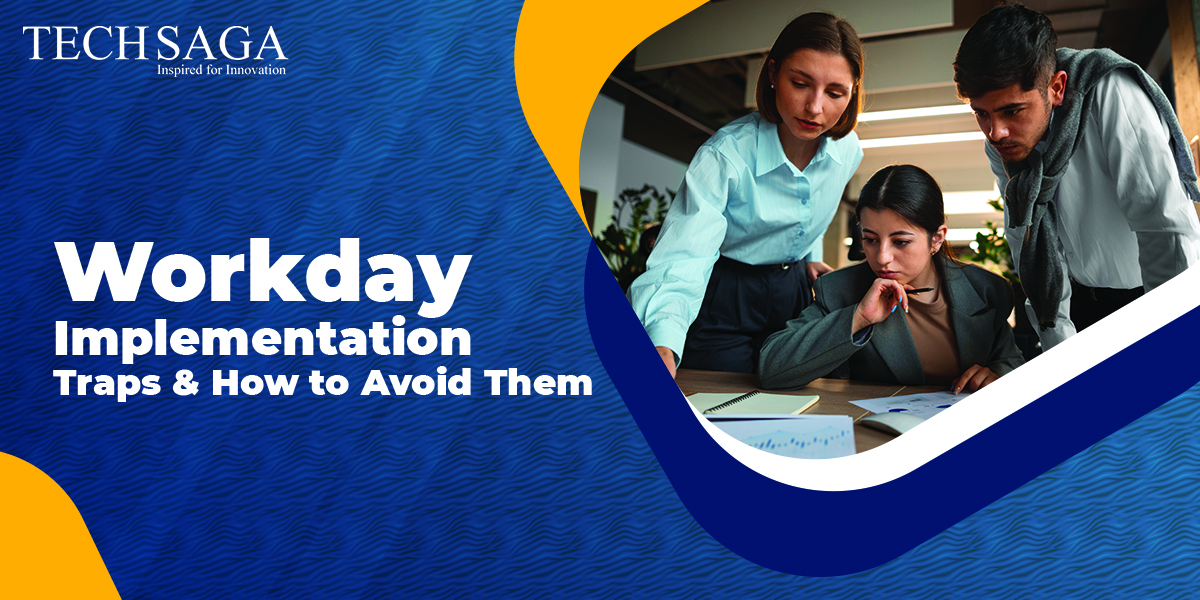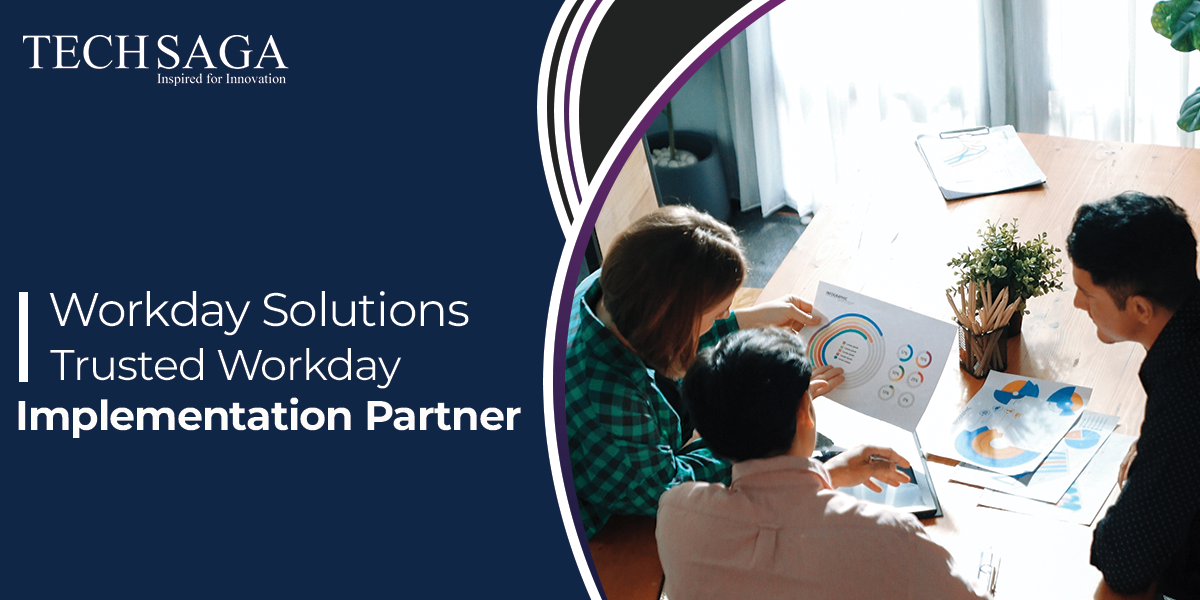Team Techsaga
Gain valuable insights and stay updated with the latest innovations through our engaging blog. Explore trends, technology advancements, and expert opinions to navigate the ever-evolving world of IT.
Workday Implementation Traps & How to Avoid Them
Technology drives growth and efficiency. Among the many solutions available, workday implementation has become one of the most sought-after digital transformations for organizations seeking to streamline HR, finance, and payroll. Yet, while the benefits are undeniable, many companies fall into common traps that derail their projects without the guidance of the right workday implementation partners.
In this implementation, is not just about software installation; it’s a complete business transformation. Therefore, overlooking planning, skipping governance, or neglecting user adoption can lead to wasted resources and disappointment. To succeed, companies must understand these pitfalls and actively take steps to avoid them, with the right implementation of Workday partners and trusted Workday consultants by their side.
Why Implementation of Workday Projects Struggles
Organizations usually begin implementing Workday with the best intentions. The platform’s promise of seamless integration and cloud-based agility is attractive. However, many projects fail to deliver on time or within budget. Why? Because implementation requires a unique blend of technical expertise, business process redesign, and change management.
Key Benefits of Implementing in Workday
- Streamlined HR and payroll processes
- Real-time financial data and analytics
- Improved employee experience with self-service features
- Enhanced compliance and security
- Seamless integration with other enterprise systems
However, the journey is not without challenges. Understanding the traps helps ensure companies don’t fall into common mistakes.
Common Traps in Workday Implementation
1. Underestimating Complexity
The most common mistake in Workday is treating it like a straightforward software upgrade. Consequently, workday is highly configurable, but that flexibility means the system must be carefully customized to fit the organization’s workflows.
Without expert Workday consultants, companies often underestimate timelines, believing the project will be quick. Instead, they experience delays when customizations become more complicated than anticipated.
2. Weak Change Management
The human element is another reason why Workday is difficult. Furthermore, employees may resist changes to processes they have used for years. Without effective communication and training, they might not see the value of the new system. Additionally, Workday partners emphasize that change management should be a core part of the project plan. Lastly, a skilled Workday consultant can help design training, engage employees early, and facilitate adoption.
3. Data Migration Issues
Data migration can silently cause issues in many Workday implementation projects. Legacy data is often messy, inconsistent, or incomplete. Skipping this step can result in the new system containing flawed information. Consequently, experienced Workday consultants recommend dedicating enough time to clean and validate data before migration. When properly executed, this helps ensure accuracy and avoids operational disruptions after launch.
4. Inadequate Testing
During Workday installation, testing frequently gets less attention than it merits. Skipping test cycles or rushing through them can lead to errors that only become apparent after the system is live.
To prevent this, the implementation partners recommend structured test phases, including unit testing, system testing, and user acceptance testing. Moreover, a dedicated Workday consultant ensures that every process is validated before going live.
5. Poor Governance and Oversight
When project leadership is unclear, Workday implementation quickly becomes chaotic. But decisions get delayed, accountability diminishes, and progress stalls. Strong governance, defining who owns each decision and how issues escalate, is essential. Additionally, this is where implementation partners step in to provide proven governance frameworks, while implementation consultants ensure consistent communication among stakeholders.
6. Unrealistic Expectations
Another temptation is to set unrealistic deadlines or budgets with insufficient funds. Hence, businesses sometimes assume Workday’s cloud setup will automatically lower costs and accelerate delivery.
Unfortunately, rushing implementation often leads to rework and additional expenses. Also, partnering with experienced Workday implementation consultants helps organizations set realistic budgets and milestones. Meanwhile, realistic expectations are maintained by using industry benchmarks provided by reliable Workday partners.
How to Avoid Workday Implementation Traps
-
Collaborate with Trusted Workday Implementation Partners
One of the most effective ways to avoid pitfalls is by choosing the right implementation partners. Consequently, they bring best practices, industry knowledge, and methodologies that streamline execution. Additionally, their role is not just to deliver technology but to guide business transformation.
-
Engage Skilled Workday Implementation Consultants
A trustworthy Workday installation consultant is knowledgeable about the project’s business and technical facets. And, they translate business needs into configurations and integrations that function effectively within Workday. Consequently, having multiple implementation consultants on a project provides specialized expertise in HR, payroll, and finance modules.
-
Prioritize Change Management and Communication
During implementation, it’s not enough to focus solely on technology. Accordingly, employees need to understand why the change is happening and how it benefits them. Lastly, through structured communication and training programs led by a Workday consultant, organizations can promote adoption and lessen resistance.
-
Give Attention to Data Quality
Data is the essential foundation of any system. Consequently, companies must focus on data cleaning, mapping, and validation well before starting migration. Likewise, workday implementation partners usually develop detailed migration strategies, while Workday consultants conduct validation to maintain data integrity.
-
Commit to Rigorous Testing
Testing must be non-negotiable in Workday implementation. Comprehensive test cycles ensure that every module, integration, and workflow function properly. However, testing scenarios are guaranteed to be in line with business realities when a Workday installation consultant is hired.
-
Build a Governance Model
Finally, governance is the glue that holds the project together. Accountability, decision-making speed, and project clarity are all guaranteed by a governance architecture. With expert Workday implementation partners, governance frameworks become practical and effective.
Common Workday in Implementation Traps vs. Solutions
| Trap in Workday Implementation | Impact on Business | Solution with Consultants & Partners |
|---|---|---|
| Underestimating Complexity | Delayed timelines, cost overruns | Engage implementation partners for structured planning |
| Poor Change Management | Employee resistance, low adoption | Use an implementation consultant to create change strategies |
| Data Quality Issues | Inaccurate reporting, compliance risks | Work with implementation consultants for data cleansing |
| Inadequate Testing | Systems errors, performance issues | Ensure robust testing with experienced partners |
| Ignoring Scalability | Costly rework in the future | Plan for growth with expert guidance |
The Role of Workday Implementation Consultants and Partners
-
Workday Implementation Partners
These implementation partners act as strategic allies, offering technical expertise, proven methodologies, and industry-specific insights. Their role is to align the platform with an organization’s unique requirements while minimizing disruptions.
-
Workday Implementation Consultants
A skilled workday implementation consultant serves as a trusted advisor throughout the journey. From planning to optimization, they ensure that businesses avoid pitfalls and achieve maximum efficiency.
To Wrap Up
A successful Workday implementation involves more than just technology; it requires strategic planning, governance, and change management. Engaging an experienced Workday implementation consultant helps organizations avoid common pitfalls and ensures the project delivers long-term value.
However, with experienced Workday implementation partners and trusted consultants, these challenges can be mitigated. By choosing the right experts, establishing clear governance, and preparing employees for change, organizations can ensure a smooth and successful deployment, turning potential risks into opportunities for growth.
At TechSaga Corporation, we specialize in the implementation of Workday, which delivers measurable business results. With our expertise, your organization will not just implement Workday; it will unlock its full potential. If you’re planning your next project, we’re here to support you every step of the way. Reach out to us today.




